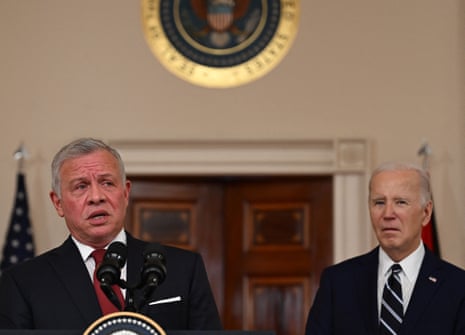Biden says ‘key elements’ of a Gaza deal are on the table
With the threat of an Israeli ground offensive looming in Rafah, Joe Biden has said the US would do “everything possible” to make a ceasefire happen.
After a meeting with Jordan’s King Abdullah II, Biden said that “the key elements of the deal are on the table,’ but “there are gaps that remain.”
Senior officials from the US, Egypt, Israel and Qatar were expected to meet in Cairo to work on a three-phase framework that would see the release of hostages and achieve an extended pause, sources familiar with the matter told the Reuters news agency.

Abdullah said Biden’s leadership was “key to addressing this conflict,” as he raised the plight of the tens of thousands of civilians killed and wounded in the fighting.
“We need a lasting ceasefire now,” the king said. “This war must end.”
Hamas said a new advance into Rafah would “blow up” continuing negotiations to return hostages in exchange for a ceasefire.
Key events
Please turn on JavaScript to use this feature
German foreign minister Annalena Baerbock said she is very concerned about Israel’s announcement that it is planning a large military offensive in Rafah.
“I am especially concerned about the announcement by the Israeli government of a large ground military operation in Rafah,” she said at a news conference with the Palestinian foreign minister in the German capital.

Harriet Sherwood
Church of England bishops have added their weight to calls for an immediate ceasefire in the war between Israel and Hamas
In a statement on Tuesday, the bishops said: “With the onset of Israel’s ground offensive into Rafah, we call for an immediate ceasefire. The relentless bombardment of Gaza and its huge cost in civilian lives and civilian infrastructure must stop. The manner in which this war is being prosecuted cannot be morally justified.
“We urge Israel to adhere to the ICJ order and to ensure that Palestinians have access to food, water, healthcare, and safety, that have long been denied to them. We welcome the [UK] foreign secretary’s recent call for an immediate pause in the fighting and would also welcome further representation to the government of Israel about the way that it is exercising its right to self-defence and to affirm adherence to international law.
“We continue to advocate for the release of the remaining hostages and an end to the missile attacks on Israel by Hamas. All sides must begin to imagine a future beyond this conflict: for a just peace for Israelis and Palestinians. This war can’t result in the consolidation of a system of occupation that has for too long denied Palestinians their rights and freedoms.
“In praying for all those in Israel and Palestine living in the midst of war and the fear of war, we pray particularly for the Palestinian Christian communities, that they may know strength and the presence of the Spirit of Jesus Christ, the Prince of Peace.
“As we consider the impact of the current conflict in the Middle East on community relations here in the UK, we again condemn all antisemitic and anti-Muslim sentiment. We are horrified by the growing threats and abuses of Jews on university campuses, in our neighbourhoods, and online. We appeal to our communities to be safe for all people whatever their nationality, ethnicity or religion. For our own part, we commit to working alongside our fellow faith leaders for the common good, despite and with our differences.”
Former UK foreign secretary calls for removal of Netanyahu

Patrick Wintour
A full scale Israeli attack on Rafah could be a terrible error that narrows down the chances of a two state solution and instead consigns the Middle East to yet more wars in which neither side can ever secure absolute victory, the former UK foreign secretary William Hague said on Tuesday.
He says the decision to go into Rafah where more than 1m Palestinians are crammed “represents the most crucial strategic moment since the war,” and the moment Israel has to choose between those that want to rely wholly on deterrence and those that believe a two state solution is the only route to peace. “The future of the Middle East might well depend on the fate of Rafah”, he warns.
Reflecting the private view of Foreign Office senior officials, he says that Israeli total victory over Hamas militarily is a mistake, since Hamas is an insurgency and an idea tooted in a population.
He urges Israel to recognise that its security is not achievable solely through deterrence if no political solution is offered.
Remarkably, he also calls for the removal of both Israeli Prime Minister Benjamin Netanyahu and the Hamas leadership, saying “the long shot of building trust and a two-state solution has little chance without the removal of Netanyahu”.
Although he admits that Netanyahu’s argument for force through deterrence has the upper hand among the Israeli population, he believes the Israeli prime minister is personally unpopular. Polls show strong support for an election once the war ends and that Netanyahu’s Likud party would be defeated.
It is nevertheless rare for a Western politician of Hague’s politics to call for Netanyahu to be dislodged.
Drawing on the lessons of Iraq and Afghanistan of which he has personal experience as foreign secretary from 2010 to 2014, he writes: “Absolute victory can be attained over an army on a battlefield but not over an insurgency that draws its strength from an idea rooted in a population. To be victorious over that, wise politics has to accompany the application of force. To roll the Israeli Defence Force into Rafah with the same approach of recent months is to ignore such politics.”
A full-scale attack on Rafah, he suggests, would be a moment of overreach.
He also suggests that without some political perspective for Palestinians, the 17,000 children made orphans by the Israeli military “will one day make up the even bigger battalions of the future’.
Lord Cameron, the foreign secretary has urged Israel to think seriously about Rafah saying “It is impossible to see how you can fight a war among these people, there is nowhere for them to go”.
The US has also said it will not support an attack on Rafah without the Israeli military devising a “credible plan that can be executed and ensures that civilians are protected, have a chance to get out of harm’s way and have access to food and water and medicine”.
In parts of the Foreign Office, the next few days are critical to persuading Israel to relent and recognise that both sides have to make painful compromises necessary to secure a long-term pause.
The Kremlin said on Tuesday that it was ready to support any action leading to the release of Israeli hostages and a ceasefire in Gaza, Reuters reports.
Kremlin spokesperson Dmitry Peskov was commenting on US talks with Israel.
28,473 Palestinians have been killed and 68,146 have been wounded in Israeli strikes on Gaza since 7 October, the Gaza health ministry said in a statement on Tuesday.
133 Palestinians were killed and 162 wounded in the past 24 hours, the ministry added.
Biden says ‘key elements’ of a Gaza deal are on the table
With the threat of an Israeli ground offensive looming in Rafah, Joe Biden has said the US would do “everything possible” to make a ceasefire happen.
After a meeting with Jordan’s King Abdullah II, Biden said that “the key elements of the deal are on the table,’ but “there are gaps that remain.”
Senior officials from the US, Egypt, Israel and Qatar were expected to meet in Cairo to work on a three-phase framework that would see the release of hostages and achieve an extended pause, sources familiar with the matter told the Reuters news agency.
Abdullah said Biden’s leadership was “key to addressing this conflict,” as he raised the plight of the tens of thousands of civilians killed and wounded in the fighting.
“We need a lasting ceasefire now,” the king said. “This war must end.”
Hamas said a new advance into Rafah would “blow up” continuing negotiations to return hostages in exchange for a ceasefire.
Opening summary
Hello and welcome to the Guardian’s continuing coverage of the Israel-Gaza war.
US president Joe Biden has said the US is working hard to broker another pause in fighting in Gaza, in order to send humanitarian aid and supplies into the region and get hostages out.
“The key elements of the deal are on the table,” Biden said, adding that “there are gaps that remain.”
We’ll have more on this in a moment, first here’s a summary of the day’s other main news.
-
Joe Biden has added his voice to growing international calls for Israel to drop plans for an all-out military assault on the city of Rafah. Speaking after talks with Jordan’s King Abdullah at the White House on Monday, the US president said: “A major military operation in Rafah should not proceed without a credible plan for ensuring the safety and support of more than 1 million people sheltering there.”
-
Benjamin Netanyahu, the Israeli prime minister, congratulated soldiers who mounted a dramatic rescue of two Israeli hostages in Rafah, where more than 1 million Palestinians have fled seeking shelter. Netanyahu described it as a “perfect operation”. The Israeli military launched airstrikes on nearby buildings to support the rescue, killing at least 67 Palestinians. Hamas later claimed that other Israeli hostages were also killed in the bombardment.
-
The families of Fernando Simon Marman and Louis Har who were held hostage in Gaza for 129 days said they were overjoyed at being reunited with their loved ones. The Israel Defense Forces said it rescued Marman, 60, and Har, 70, from a second-floor apartment in the southern city of Rafah while launching a heavy airstrikes in the area.
-
Palestinians in Rafah described the panic and despair that has spread across Gaza’s southernmost city after Israel said it would expand its ground offensive into the densely packed area. At least half of Gaza’s population of 2.3 million is crammed into Rafah, a city that previously housed a fraction of that amount.
-
A spokesperson for Rishi Sunak said the UK prime minister was “deeply concerned about the prospect of a military offensive in Rafah”. The UK foreign secretary, David Cameron, said it was “impossible to see how you can fight a war among these people, there is nowhere for them to go … we are very concerned about the situation and we want Israel to stop and think seriously before it takes any further action.”
-
The US senate appears on track to approve a long-awaited package of funding for Ukraine, Israel and Taiwan. The senate voted 66-33 to sweep aside the last procedural hurdle before a vote on passage that could come on Wednesday. The bill would next go to the House. Mike Johnson, the Republican House speaker, said the package lacked border security provisions, calling it “silent on the most pressing issue facing our country”.
